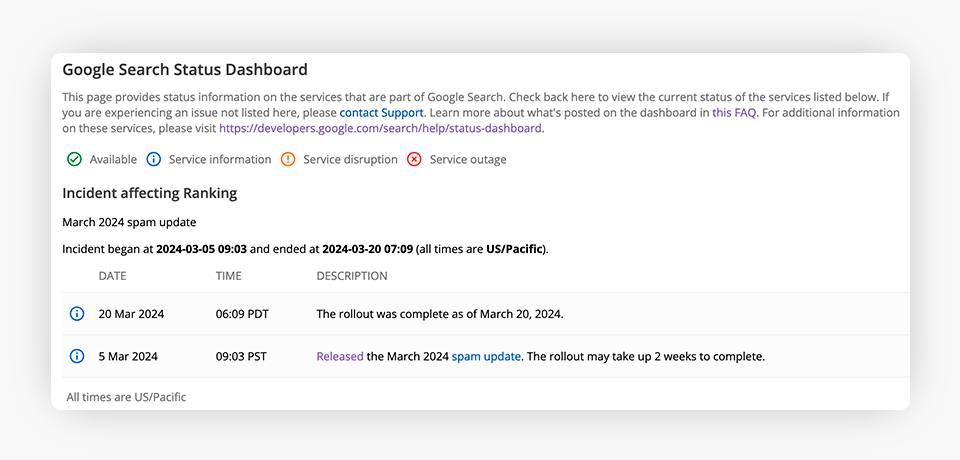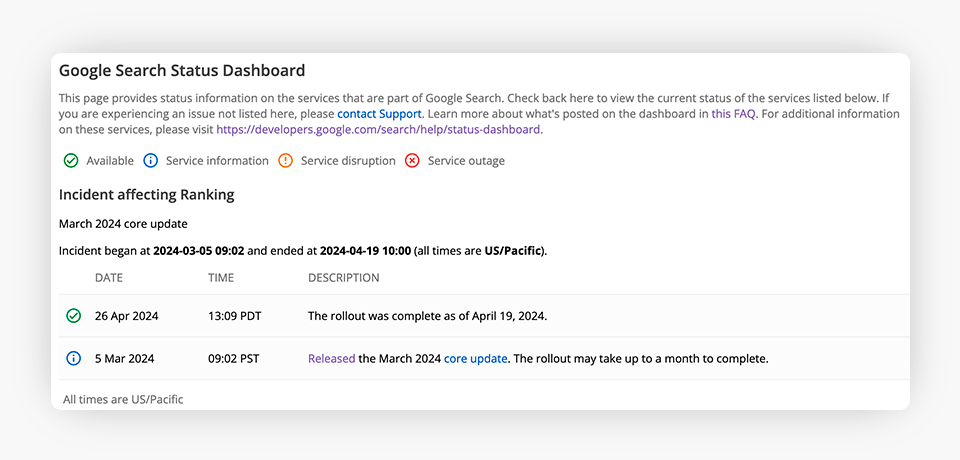We can’t send you updates from Justia Onward without your email.
Unsubscribe at any time.
Google officially announced on April 26, 2024, that the March 2024 core update had concluded after causing fluctuations in web rankings for over a month. The update introduced significant algorithm changes to assess websites' overall quality and relevance.
Google started the rollout of its first core update and algorithm update of the year, named the March 2024 core update, on March 5, 2024.
Today we announced the March 2024 core update & new spam policies that, in combination, are designed to show less content made to attract clicks and more content that people find useful. Learn more: https://t.co/wQVZ8mExRB
— Google Search Central (@googlesearchc) March 5, 2024
Google’s documentation warned that this update was more complex, enhancing their core ranking systems with algorithms to prioritize the most helpful information online and minimize duplicate content in search results.
Alongside the ranking adjustments, Google revised its spam policies as part of the March 2024 update, which commenced on March 5 and concluded on March 20. The aim was to eradicate “lowest-quality” content from search results by addressing three harmful practices: expired domain abuse, scaled content abuse, and site reputation abuse (enforcement begins on May 5).

The Google March 2024 core update rollout, lasting 45 days, concluded on April 19, but Google officially confirmed its completion on its Google Search Status Dashboard on April 26, a week later.

Google also announced this completion on X.
The March 2024 core update is complete, having ended on April 19. The ranking feedback form is now ready at https://t.co/EiM7C8PtaS and will remain open through May 31. We’ve also updated our Debugging drops in Google Search traffic help page here: https://t.co/pxz3nXBXxP
— Google Search Central (@googlesearchc) April 26, 2024
Exploring Google’s March 2024 Core Update: Understanding its Impact
Unlike previous updates, the March 2024 core update by Google enhances various components within the core system, with Google rolling out updates to these systems over recent weeks. Specifically, Google has refined its assessment of webpages considered “unhelpful” or providing poor user experiences, including those optimized solely for search engines.
Consequently, Google will no longer announce new helpful content updates separately; instead, they are integrated into the core update system.
The March 2024 core update from Google signals a shift in SEO strategies, compelling professionals to adapt. Emphasizing user-centric methods, it aims to tackle low-quality content and manipulative tactics. The March 2024 update specifically targeted two key areas: low-quality content and spam.
Low-Quality Content
Initially, Google indicated a 40% decrease in low-quality and unhelpful content. However, Google has now revised this figure to approximately 45%.
Google’s ongoing emphasis on original, high-quality content remains steadfast. This update continues the effort to downgrade sites featuring thin, unoriginal content, AI-generated spam, and content tailored solely for search engine algorithms rather than user experience.
Watch this clip to learn more about creating high-quality legal content.
Google refreshed its help center page to detail how site owners can troubleshoot declines in Google Search rankings.
Finally, Google has also introduced a new feedback form for site ranking adjustments that you wish to have the Google Search team examine more thoroughly (note that Google mentions you can use this form until May 31).
Spam
Beyond rewarding informative content, the update also introduced a set of fresh spam policies designed to combat manipulative SEO techniques. These policies specifically target practices that exploit search engine algorithms to enhance overall user experience.
Google has focused on three primary areas within its spam policies:
- Expired Domain Abuse. Expired domain abuse entails acquiring expired domain names to manipulate search rankings through hosting low-value content. This strategy exploits the domain’s reputation to gain prominence in search results without offering meaningful content to users. Typically, these domains depend solely on search engine visibility rather than organic discovery by visitors.
- Scaled Content Abuse. This practice involves generating multiple pages primarily to manipulate search rankings, with minimal user benefit. It entails producing significant amounts of unoriginal content, regardless of its creation method. This revised policy extends beyond prior spam regulations on automatically generated content, empowering Google to effectively tackle scaled content abuse, irrespective of whether it’s produced automatically, manually, or through a combination of both methods.
- Site Reputation Abuse. Site reputation abuse occurs when third-party pages are published without substantial oversight from the primary site to manipulate search rankings by exploiting the primary site’s ranking signals. These pages, including sponsored, advertising, or partner pages, typically deviate from the host site’s primary purpose and provide users with little value. As previously stated, enforcement of the site reputation abuse policy will begin on May 5th.
It’s important to remember that Google’s March 2024 core update focuses on promoting and rewarding exceptional web pages rather than imposing penalties. Google may refresh this algorithm periodically without necessarily communicating about these updates in the future.
To sum up, it’s essential to acknowledge variations in content value and swiftly tackle issues such as poor user experience, spam violations, or dependence on AI-generated content.
Final Thoughts
Awareness of Google algorithm updates is crucial for brands, businesses, and organizations because they significantly influence website performance in search results. Websites with top-notch, user-focused content will rank higher. Conversely, sites using poor tactics will likely substantially drop their organic traffic.
The fluctuations in rankings following a core update, whether positive or negative, can directly affect organic traffic, conversions, and revenue. However, as we have mentioned in previous blog posts, being informed about these updates empowers site owners to differentiate between traffic changes caused by site modifications and those resulting from alterations to Google’s ranking algorithm.
Fortunately, Google’s latest core algorithm update has increased transparency, offering deeper insights into content evaluation. Websites can boost visibility by thoroughly addressing topics, offering valuable insights, and showcasing credibility and expertise. Furthermore, organizing content effectively and ensuring user-friendly navigation can positively influence user experience signals, which play a vital role in Google’s grading system.
At this point, we highly encourage people to start running analyses and assessing any possible impact on the search results.
Are you looking for a new law firm website provider? Explore Justia Elevate, our groundbreaking website platform created exclusively for lawyers and law firms.
Related Posts